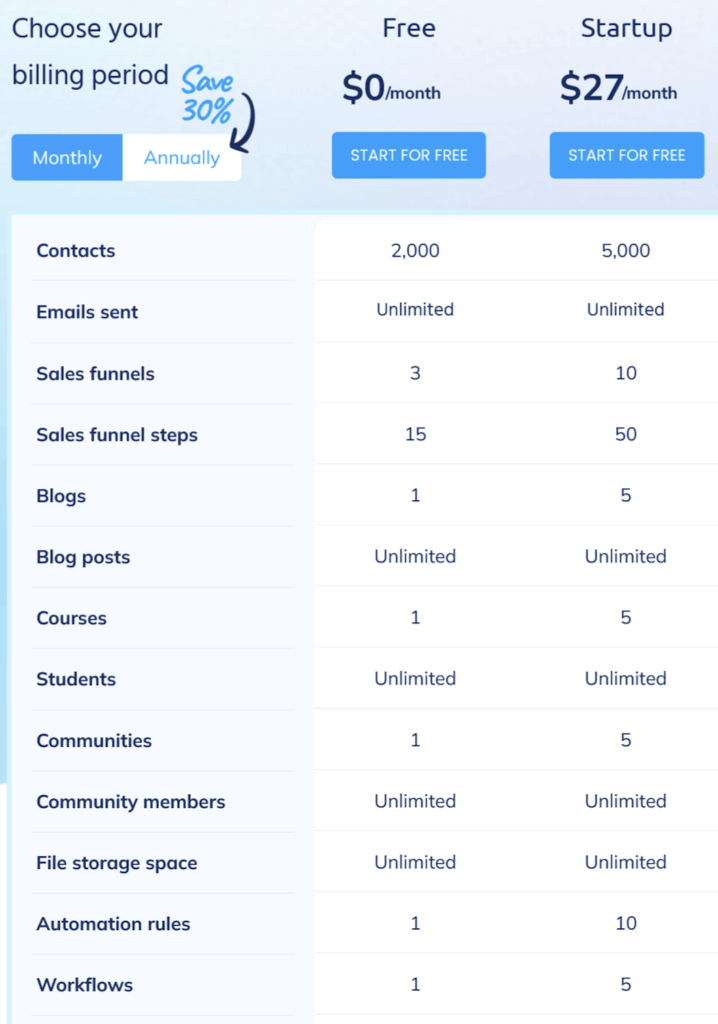If you’re considering the transition from WordPress to Systeme.io, or are just starting to build your online presence, it is essential to evaluate the options carefully. The choice ultimately boils down to your specific business model and requirements.
As you navigate this decision, the key question to ask yourself is;
“What is my business model?”

This query will help guide you towards the platform that best aligns with your goals and objectives.
Are you primarily focused on affiliate marketing with advertorials, or do you plan to sell your informational products?
Perhaps you envision building a niche website and monetizing it, or you have aspirations of leveraging webinars to market a high-ticket course.
Understanding the core elements of your business strategy will be instrumental in determining the better fit between Systeme.io and WordPress.
By taking the time to reflect on your business model, you can make a more informed decision that sets you up for long-term success.
Both platforms offer distinct advantages, and the choice ultimately comes down to your specific needs and preferences.
Let’s take a closer look at the features and capabilities of Systeme.io and WordPress to help you make an informed decision.
Okay, let’s dive into this:
WordPress as a Digital Swiss Army Knife
- WordPress is a highly customizable content management system (CMS) that powers millions of websites worldwide.
- It provides users with a vast library of themes and plugins, allowing for endless creative possibilities in website design and functionality.
- This versatility and flexibility is a major reason for WordPress’ widespread popularity and adoption.
The Downside: “With Great Power Comes Great Responsibility”
- While the power and customization of WordPress is a strength, it also brings additional responsibilities for the user.
- The flexibility of WordPress means there is a higher learning curve and more technical management required compared to more simplified website builders.
- Users need to handle tasks like plugin management, website security, backups, and performance optimization to ensure their WordPress site runs smoothly.
The Rise of Systeme.io
- In contrast to the complexity of WordPress, Systeme.io has emerged as a popular all-in-one platform, particularly for small businesses, startups, and non-technical users.
- Systeme.io offers a streamlined, efficient solution for creating and selling digital products, running sales funnels, managing email marketing, and more.
- The appeal of Systeme.io lies in its simplicity, ease of use, and ability to handle multiple business needs in a single, integrated platform – often at a lower cost than building out a custom WordPress site.
So in summary, WordPress provides unparalleled customization and flexibility, but also requires more hands-on technical management.
Systeme.io has gained traction by offering a more beginner-friendly, all-in-one alternative, especially for users focused on digital product sales and marketing.
Comparing the Capabilities of Systeme.io and WordPress: Choosing the Right Fit for Your Business
When considering the options between Systeme.io and WordPress, it’s important to understand the key differences and capabilities of each platform.
While there is significant overlap in the functionalities they offer, there are also distinct advantages and limitations to explore.
One of the primary advantages of WordPress is the flexibility it provides through the use of plugins and third-party integrations.
This allows you to tailor the platform to your specific business needs, whether that’s optimizing your website for search engine rankings or automating your email marketing workflows.
The extensive plugin ecosystem gives you the freedom to expand the functionality of your WordPress site as your business evolves.
In contrast, Systeme.io is designed as a more all-inclusive platform, prioritizing ease of use and streamlined operations.
While this approach can be beneficial for simplifying certain tasks, such as creating sales pages, it may not offer the same level of customization and integration capabilities as WordPress.
Systeme.io’s focus on being a self-contained solution means that adding external tools and features may require more effort and potentially compromise the platform’s seamless experience.
For example, if you’re building a blog and aiming to optimize it for search engine visibility, WordPress may be the better choice.
You can leverage powerful SEO plugins like Yoast or Rank Math to automate internal linking, metadata optimization, and other crucial ranking factors.
Achieving similar levels of optimization and customization within Systeme.io may be more challenging, as the platform’s integrated approach may limit your ability to incorporate specialized third-party tools.
On the other hand, if your primary focus is on creating and selling your informational products, Systeme.io’s all-in-one functionality could be a compelling advantage.
Its streamlined sales funnels, email marketing capabilities, and integrated payment processing can simplify the process of launching and managing your product offerings.
Ultimately, the decision between Systeme.io and WordPress will depend on your specific business goals, the complexity of your requirements, and your comfort level with the level of customization and integration necessary to achieve your objectives.
By carefully evaluating your needs and the unique strengths of each platform, you can make an informed decision that sets your online business up for long-term success.
It’s important to approach the comparison between Systeme.io and WordPress with a critical and unbiased perspective, especially when considering the influence of affiliates.
While affiliates may have a vested interest in promoting Systeme.io, it’s crucial to look beyond the persuasive rhetoric and assess the platforms based on their actual capabilities and limitations.
Systeme.io’s all-in-one nature makes it an excellent choice for selling digital products, with its streamlined sales funnel and integrated features.
However, when it comes to building niche websites and blogs, WordPress may be the better option, as it offers greater flexibility and customization through its extensive plugin ecosystem.
Similarly, if your focus is on e-commerce, Shopify may be a more suitable platform than Systeme.io, as it is specifically designed for online retail and offers robust features for managing inventory, processing payments, and optimizing the shopping experience.
Understanding the strengths and weaknesses of both Systeme.io and WordPress is essential in determining the right platform for your specific business needs.
Let’s dive deeper into the key metrics:
Ease of Use:
Systeme.io has a clear advantage in terms of ease of use, with its Systeme Certification Course and more straightforward learning curve.
WordPress, on the other hand, can be more overwhelming, especially for those new to website development, due to the sheer number of settings, plugins, and potential conflicts to manage.
Price:
Assessing the pricing can be complex, as it often depends on the specific requirements of your business model.
In an example of selling your first eBook on a WordPress site, the cost of a page builder like OptimizePress (currently $199 per year) would need to be factored in.


Systeme.io, with its all-inclusive pricing, may present a more cost-effective solution in certain scenarios.
However, it’s important to consider the long-term implications and the growth potential.
While Systeme.io may be more affordable in the short term, the limitations in customization and integration capabilities could hinder your ability to scale and adapt your business over time.
WordPress, despite its initial learning curve, offers greater flexibility and the potential to expand your online presence more seamlessly.
By evaluating these factors objectively, you can make an informed decision that aligns with your business goals and long-term vision, rather than being swayed solely by the persuasive tactics of affiliates.
Marketing & Sales Features
Systeme.io wins hands down because it was built for marketers while WordPress was built for bloggers.
That said, you could still use WordPress for marketing. You’d have to add several extra paid plugins and tools to achieve your objectives.
If you’re planning to mostly sell products rather than blogging, you’re better off with Systeme.io.
Customization & Flexibility
WordPress undeniably excels in this area, but it does come with a steep learning curve and potential technical challenges.
With WordPress, you have powerful customization options, but they come with the responsibility of managing more complex setups.
You’ll need to weigh whether the visual appeal is worth the time and effort required.
If your priority is to start generating income quickly, Systeme.io offers all the necessary tools in one place.
While it may have some limitations in flexibility and customization, the pages and blogs you create will still look professional and polished.
A practical approach could be to handle your sales through Systeme.io while gradually learning WordPress to build a blog and expand your content marketing.
There’s no rule against using both platforms; you might just need a separate domain for your blog.
Support
Systeme.io stands out with its exceptional support team, consistently responding to queries within a few hours. Their reliability and quick response times are truly impressive.
On the other hand, with WordPress, you might need to rely on community forums and groups for assistance. While there is a wealth of information available, the accuracy and helpfulness of the responses can vary.
If you encounter a challenging issue, you may find yourself needing to hire a professional, such as through Fiverr, to resolve it.
Quick Summary
| Feature | Systeme.io | WordPress |
| Ease of use | User-friendly interface; all-in-one platform; quick learning curve | Greater flexibility but steeper learning curve; requires plugins and technical assistance |
| Cost | Transparent pricing with all features included; more affordable for startups | Requires additional expenses for plugins and hosting; variable costs depending on needs |
| Flexibility | Limited but adequate customization; pre-designed templates; efficient and streamlined | Highly customizable; thousands of themes and plugins; more complex setup |
| Marketing | Integrated tools for marketing, sales, Built-in tools for marketing, sales, and email campaigns; designed for business growth | Requires third-party plugins (e.g., WooCommerce, Elementor); better for advanced setups Functionality |
| Functionality | All-in-one tools for marketing, sales, and email campaigns; business growth-oriented | Requires multiple plugins for equivalent functionality; adaptable for various needs |
| Support | Dedicated customer support; active and growing community; consistent updates | Large global community; extensive resources; quality of support can vary |
The Verdict
Based on the above, here’s what I would recommend
Determine your business goals and model: The first step is to clearly define the type of business you want to be involved in.
Are you primarily looking to create and sell digital products?
Or are you aiming to build a reputable niche website?
This will help you determine the most suitable platform.
Evaluate the platform capabilities:
- If your primary focus is on creating and selling digital products, Systeme.io seems to be the better choice. It offers a comprehensive, all-in-one solution with features like sales pages, affiliate management, email marketing, and more, making it a streamlined platform for this purpose.
- However, if you’re looking to build a reputable niche website, WordPress may be the better option. While it has a steeper learning curve, WordPress offers greater flexibility, customization, and a vast ecosystem of plugins to enhance your website’s functionality.
Consider your technical expertise and resources:
- Systeme.io appears to be the more beginner-friendly option, with its simplified interface and certification course, making it a suitable choice for non-technical users or those new to online business.
- WordPress, on the other hand, requires a certain level of technical expertise to manage the complexities of the platform, such as handling plugin conflicts and website maintenance. This may be more suitable for experienced users who are willing to invest the time and resources to fully customize and maintain their website.
Weigh the long-term implications:
- While Systeme.io may be more cost-effective in the short term, you should also consider the potential limitations in customization and integration capabilities. This could hinder your ability to scale and adapt your business over time.
- WordPress, despite its initial learning curve, offers greater flexibility and the potential to expand your online presence more seamlessly in the long run.
Make an informed decision:
Based on your business goals, technical expertise, and long-term considerations, make an informed decision on the platform that best aligns with your needs.
Remember to stay objective and not be swayed solely by the persuasive tactics of affiliates, as they may have their own biases and interests to consider.
The key is to thoroughly evaluate both Systeme.io and WordPress, understanding their strengths, weaknesses, and suitability for your specific business model. This will help you make a decision that sets you up for long-term success.
